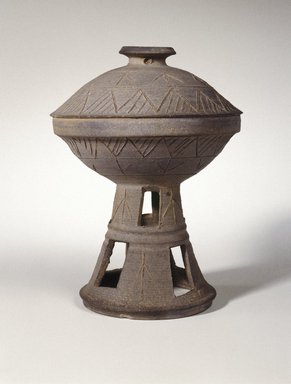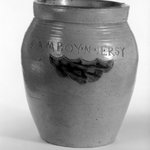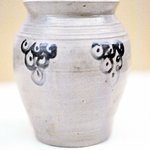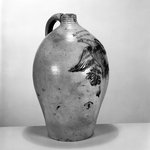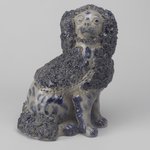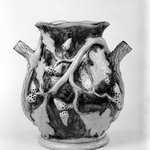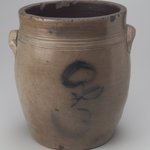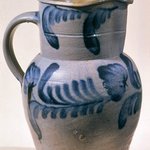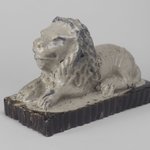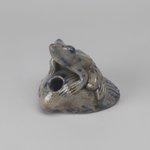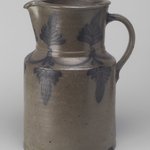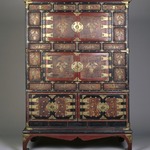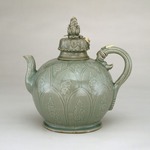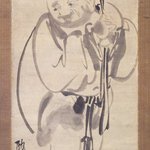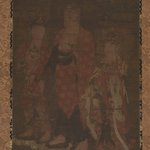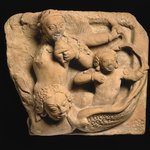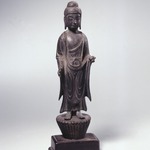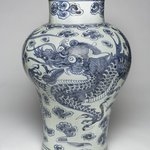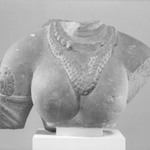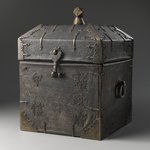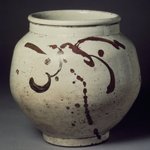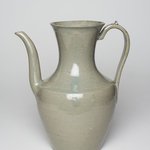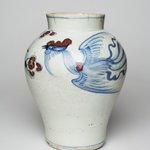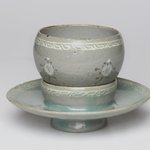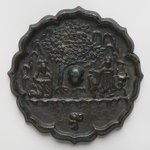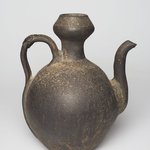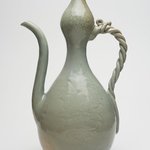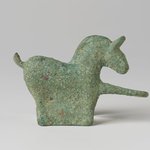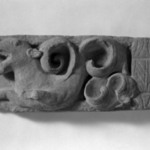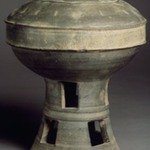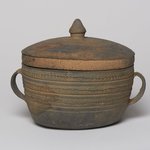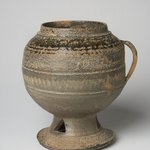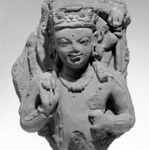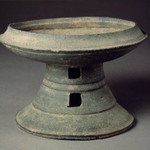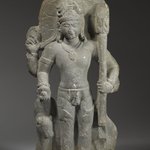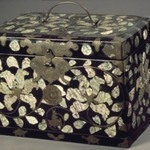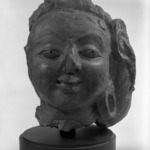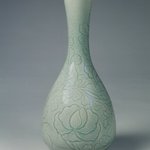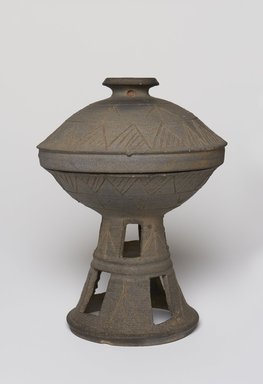
Pedestal Bowl with Lid
Asian Art
On View: Asian Galleries, South, 2nd floor
This pedestal bowl was most likely a mortuary vessel made to be placed in the tomb. In life, this type of vessel would have been used for warming food. Hot coals would have been placed under the vessel through the piercings in the base. The lid lifts off and turns upside down to become another bowl, with its central knob serving as the bowl’s foot.
The designs on this stoneware bowl are similar to ones on bronze artifacts. The bird footprint motif filling the space between the perforations might allude to the bird as a conveyance for the soul of the deceased to the afterlife.
The designs on this stoneware bowl are similar to ones on bronze artifacts. The bird footprint motif filling the space between the perforations might allude to the bird as a conveyance for the soul of the deceased to the afterlife.
MEDIUM
Stoneware
DATES
5th century
DYNASTY
Silla Dynasty
PERIOD
Three Kingdoms Period (Silla)
DIMENSIONS
7 7/8 x 5 1/2 in. (20 x 14 cm)
Diameter at lid: 5 1/2 x 2 3/4 in. (7 x 14 cm)
Diameter at base: 5 7/8 x 5 1/2 in. (15 x 14 cm) (show scale)



COLLECTIONS
Asian Art
ACCESSION NUMBER
40.519a-b
CREDIT LINE
Gift of Sir George Sanson
CATALOGUE DESCRIPTION
From "Korean Art Collection in the Brooklyn Museum" catalogue:
This grayish-blue stoneware was made with fine clay, and shows traces of a surface finishing technique that utilized a potter's wheel. A basin-shaped circular knob forms the handle of the cover. Fine horizontal lines divide both the bowl and the lid of the vessel into two areas, containing bird footprint motifs and triangles filled with parallel lines. The vessel stand is also divided into two areas by a horizontal band. Each of the two areas is decorated with four alternating rectangular perforations, with bird footprint motifs filling in the space between perforations. The stand flares out gently to form a round protruding edge, which is then inset to form the base.
Accession card:
Mortuary food vessel (tazza shape) with cover. High stem foot, wide shoulders and mouth grooved to receive a cover. The cover is domed with a hollow knob on top. The foot is hollow and cut out in eight rectangular portions in two tiers. This is the most characteristic vessel type among Silla burial pottery. The lid lifts off and turns upside down to become another bowl, its central knob serving as the bowl's foot. This vessel at the Brooklyn Museum is unusual in having its original lid and also in having bold incised designs on its surface. Coarse, gritty, slate gray pottery, unglazed. Rings from the potter's wheel are clearly evident. Traces of earth still adhering.
Condition: Mouth chipped.
EXHIBITIONS
MUSEUM LOCATION
This item is on view in Asian Galleries, South, 2nd floor
CAPTION
Pedestal Bowl with Lid, 5th century. Stoneware, 7 7/8 x 5 1/2 in. (20 x 14 cm). Brooklyn Museum, Gift of Sir George Sanson, 40.519a-b. Creative Commons-BY (Photo: , 40.519a-b_PS11.jpg)
IMAGE
overall, 40.519a-b_PS11.jpg., 2017
"CUR" at the beginning of an image file name means that the image was created by a curatorial staff member. These study images may be digital point-and-shoot photographs, when we don\'t yet have high-quality studio photography, or they may be scans of older negatives, slides, or photographic prints, providing historical documentation of the object.
RIGHTS STATEMENT
Creative Commons-BY
You may download and use Brooklyn Museum images of this three-dimensional work in accordance with a Creative Commons license. Fair use, as understood under the United States Copyright Act, may also apply.
Please include caption information from this page and credit the Brooklyn Museum. If you need a high resolution file, please fill out our online application form (charges apply).
For further information about copyright, we recommend resources at the United States Library of Congress, Cornell University, Copyright and Cultural Institutions: Guidelines for U.S. Libraries, Archives, and Museums, and Copyright Watch.
For more information about the Museum's rights project, including how rights types are assigned, please see our blog posts on copyright.
If you have any information regarding this work and rights to it, please contact copyright@brooklynmuseum.org.
RECORD COMPLETENESS
Not every record you will find here is complete. More information is available for some works than for others, and some entries have been updated more recently. Records are frequently reviewed and revised, and we welcome any additional information you might have.
